Related Research Articles
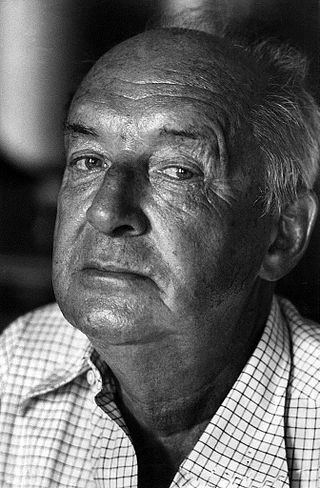
Vladimir Vladimirovich Nabokov, also known by the pen name Vladimir Sirin, was a Russian-American novelist, poet, translator, and entomologist. Born in Imperial Russia in 1899, Nabokov wrote his first nine novels in Russian (1926–1938) while living in Berlin, where he met his wife. He achieved international acclaim and prominence after moving to the United States, where he began writing in English. Nabokov became an American citizen in 1945 and lived mostly on the East Coast before returning to Europe in 1961, where he settled in Montreux, Switzerland.
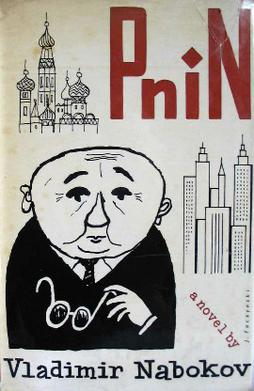
Pnin is Vladimir Nabokov's 13th novel and his fourth written in English; it was published in 1957. The success of Pnin in the United States launched Nabokov's career into literary prominence. Its eponymous protagonist, Timofey Pavlovich Pnin, is a Russian-born assistant professor in his 50s living in the United States, whose character is believed to be based partially on the life of both Nabokov's colleague Marc Szeftel as well as on Nabokov himself. Exiled by the Russian Revolution and what he calls the "Hitler war", Pnin teaches Russian at the fictional Waindell College, loosely inspired by Cornell University and Wellesley College—places where Nabokov himself taught.
Ada or Ardor: A Family Chronicle is a novel by Vladimir Nabokov published in 1969.
"The Vane Sisters" is a short story by Vladimir Nabokov, written in March 1951. It is famous for providing one of the most extreme examples of an unreliable narrator. It was first published in the Winter 1958 issue of The Hudson Review and then reprinted in Encounter during 1959. The story was included in Nabokov's Quartet (1966), Nabokov's Congeries, Tyrants Destroyed and Other Stories (1975), and The Stories of Vladimir Nabokov (1995).

The Gift is Vladimir Nabokov's final Russian novel, and is considered to be his farewell to the world he was leaving behind. Nabokov wrote it between 1935 and 1937 while living in Berlin, and it was published in serial form under his pen name, Vladimir Sirin.
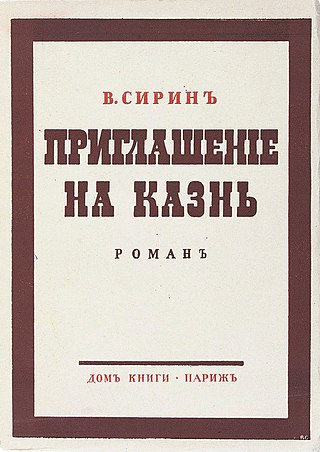
Invitation to a Beheading is a novel by Russian American author Vladimir Nabokov. It was originally published in Russian from 1935 to 1936 as a serial in Sovremennye zapiski, a Russian émigré magazine. In 1938, the work was published in Paris, with an English translation following in 1959. The novel was translated into English by Nabokov's son, Dmitri Nabokov, under the author's supervision.
The Real Life of Sebastian Knight is the first English-language novel by Vladimir Nabokov, written from late 1938 to early 1939 in Paris and first published in 1941. A work centred on language and its inability to convey any satisfactory definition, it has been identified as a forerunner of the postmodernist novel.
The Eye, written in 1930, is Vladimir Nabokov's fourth novel. It was translated into English by the author's son Dmitri Nabokov in 1965.
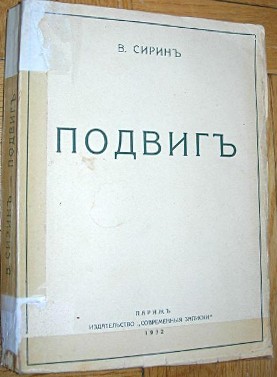
Glory is a Russian novel written by Vladimir Nabokov between 1930 and 1932 and first published in Paris.
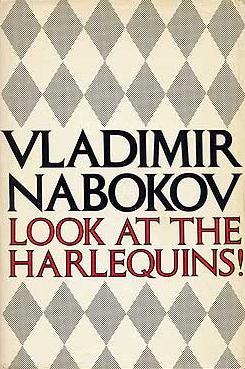
Look at the Harlequins! is a novel written by Vladimir Nabokov, first published in 1974. The work was Nabokov's final published novel before his death in 1977.
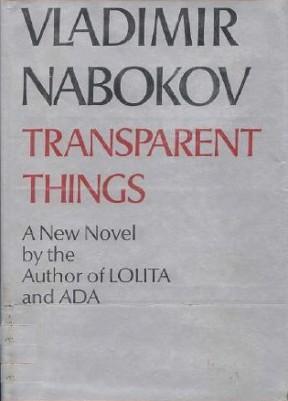
Transparent Things is a novel by Vladimir Nabokov published in 1972. It was originally written in English.
"Spring in Fialta" is a short story written by Vladimir Nabokov in 1936, originally as Весна в Фиальте in Russian, during his exile in Berlin. The English translation was performed by Nabokov and Peter Pertzov. Spring in Fialta is included in Nine Stories and Nabokov's Dozen.
"The Aurelian" is a short story first written in Russian as Pil'gram by Vladimir Nabokov during his exile in Berlin in 1930. After translation by Nabokov and Peter Pertzov it was published in English in The Atlantic Monthly in 1941. The Aurelian is included in Nine Stories and Nabokov's Dozen.
Tyrants Destroyed and Other Stories is a collection of thirteen short stories by Vladimir Nabokov. All but the last one were written in Russian by Nabokov between 1924 and 1939 as an expatriate in Berlin, Paris, and Menton, and later translated into English by him and his son, Dmitri Nabokov. These stories appeared first individually in the Russian émigré press. The last story was written in English in Ithaca, New York in 1951. The collection was published in 1974.
"The Leonardo" is a short story written in Russian by Vladimir Nabokov in Berlin in the summer of 1933. It was first published as Korolyyok in Posledniye Novosti in Paris the same year, and in 1956 as part of the collection Vesna v Fialte. After its translation into English by the author and his son Dmitri Nabokov it was incorporated into the collection A Russian Beauty and Other Stories and published in 1971.

Lolita is a 1955 novel written by Russian-American novelist Vladimir Nabokov that addresses the controversial subject of hebephilia. The protagonist is a French literature professor who moves to New England and writes under the pseudonym Humbert Humbert. He describes his obsession with a 12-year-old "nymphet", Dolores Haze, whom he kidnaps and sexually abuses after becoming her stepfather. Privately, he calls her "Lolita", the Spanish diminutive for Dolores. The novel was originally written in English, but fear of censorship in the U.S. and Britain led to it being first published in Paris, France, in 1955 by Olympia Press.
Sounds is a short story by Russian American author Vladimir Nabokov originally written in Russian in September 1923.
The Wood-Sprite is a story by Vladimir Nabokov, originally published in Russian in 1921. It was his first published story.
The Passenger is a short story by Russian American author Vladimir Nabokov originally published in Russian in 1927.
"That in Aleppo Once..." is a short story written by Russian-born author Vladimir Nabokov (1899–1977). First published in Atlantic Monthly in 1943, the story takes epistolary form, with an unnamed narrator describing his recollections of himself and his wife's deteriorating relationship while fleeing German occupation during Case Anton. The narrator reveals to his correspondent the likelihood his wife was not real, examining this premise during the account of events.
References
- 1 2 Boyd, Brian (10 June 2016). Vladimir Nabokov: The Russian Years. Princeton University Press. ISBN 9781400884025 . Retrieved 22 March 2023.
- 1 2 Connolly, Julian (17 June 2013). Zunshine, Lisa (ed.). Nabokov at the Limits: Redrawing Critical Boundaries. Taylor & Francis. ISBN 9781135658700 . Retrieved 22 March 2023.
- ↑ Rogers, Thomas (9 March 1975). "Early, artful Nabokov". The New York Times. Retrieved 22 March 2023.